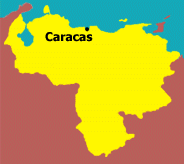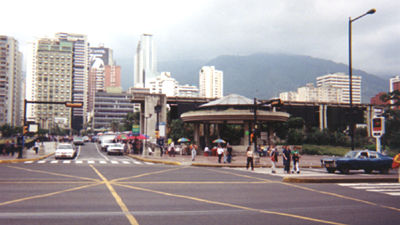Saturday, December 16, 2000. 6:51 p.m. In the Sabana Grande Wendy's, Caracas.

Should I feel guilty about eating fast food in a foreign country? Food has been in interesting subject here. My tastes are not the same as the average Venezuelan-on-the-street. On the street, vendors sell donuts and fried, cheesy things that I think are called cachapas. I had one accidentally at lunchtime at a fast-food chicken restaurant. I thought I was getting fries, but no, it was this doughy fried item. The taste reminded me of a cheese danish. I've had little appetite so far, but this Wendy's sandwich seems tasty. Moreover, it's a chance to rest my feet.
My travels today took me all over the city of Caracas. At 9, I took the Metro from my hotel to Petare. This emptied me out on a colorful hillside market near the eastern edge of the city. The guidebooks said the bus terminal was nearby. My mission was to buy a ticket to Ciudad Bolivar. The bus terminal is called Terminal de Oriente, so I began looking for a local bus that would take me there. Above the Metro, I found a continuous loop of bumper-to-bumper buses. I boarded one that said "T. Oriente" on the side. It climbed a hill on a crowded street, barging through traffic, barely avoiding collisions. It reached an expressway, turned around, and headed back. Turns out this is a local bus that does not go to the main bus terminal. Embarrassed, I realized I was one of only two people left on the bus, and, with only a general orientation of the town, was lost. The other passenger was a very patient woman who spoke no English but was able to take me to the Metro on foot, commenting on the traffic as we walked. It's always like this, she said, smiling. I boarded the Metro and fled the scene.

At this point, my plan was to head to the part of town that I perceived to be the central tourist area: Plaza Bolivar and the Venezuelan capitol buildings. Once there, I would buy a map. But there were no bookstores in the shopping mall I stopped in for lunch. Outside, the same kind of street vendors were hawking fruit, electronics, toys, junk, etc. They are everywhere. I have never been to a place that has seemed more alive than the Caracas streets.
I walked through the immaculately landscaped Plaza Bolivar and saw the profiles of some familiar buildings. Taking a break from my search for a good map, I decided to follow the main strip of vendors toward Parque Central (Central Park), and the museum of modern art. I stopped briefly to join a crowd watching a police marching band (sort of like a U.S. fire department band; they even played "Stars and Stripes Forever") and then found the museum. It is a large, free and modern museum with clean restrooms. Despite its fine exhibits -- including a whole room filled with Picasso pencil sketches -- I was one of only two visitors I saw in it. Caracas is a city of contrast. A gleaming metro and a rickety bus network. Tall glass skyscrapers and slums. Unreliable, broken payphones but cellular phones everywhere. Gorgeous mountains and heaps of street garbage. A crowd watching the police band and no one in the art museum.
At this point I will point out that I have yet to encounter another American here. I've seen only one group of people who I perceived to be foreign tourists. They were three guys my age examining a map in the subway. They were dressed in hiking garb and each carried a huge backpack.

After my visit to the art museum (and a brief consultation of my guidebook) I decided to visit Aeroexpresos Ejecutivos, the luxury bus line with offices elsewhere in the city. Perhaps they'd have service to Cuidad Bolivar. After a long wait in line at their ticket counter, I determined that they did not.
On my way back to the Altamira Metro station, on an empty but open stretch of sidewalk within view of a police station, a skinny man approached me and began talking fast. He reached for my watch as if to ask what time it was, or where I got it. It's a cheap, velcro watch. It's mine. "Es mio," I said sternly, walking faster. The man then swiped at the front pocket of my pants, where I was carrying my camera (disposable) and my wallet (containing about US$20 worth of Bolivars). The pocket was velcroed shut. The man wasn't fast enough. "No, No!," I said, and gave him a shove with my arm. He bolted. Moral: If you're an American tourist, stay on the main roads. Or if you're a Venezuelan thief, at least carry a knife or something.
Now it was 3:30 p.m., I hadn't purchased a bus ticket yet and I'd nearly been robbed. This didn't slow me down. I got back on the Metro headed to Petare. This time, I walked in a different direction to another local bus stop. The local buses are called por puestos. I asked several drivers if they went to Terminal de Oriente, and they all said no and pointed back toward the other side of the Metro station. I returned to the original por puesto stop I tried in the morning and asked another driver. He pointed back toward the other side of the Metro, from where I'd come. Discouraged, I walked back to the Metro station. Plan B was to flag a taxi and get to the bus station that way. Expensive. I consulted the map posted in the Metro station, trying to figure out if there was perhaps some other spot where these local buses stopped. There was, and I went there. At this point, I learned something important. Bus drivers place small signs in their front windows indicating where they're going next. Markings on the side of the bus are mostly meaningless. The por puestos I found in a small, isolated lot behind the Metro stop said "T. Oriente." Bingo.
After another harrowing ride through Caracas traffic, I was at the main bus terminal. I bought a Pepsi and a 7:30 a.m. ticket to Ciudad Bolivar with no difficulty. Then I walked over to a newsstand to by a CANTV phone card. "Un carte de teléfono, um, una tarjeta," I said. "Where are you from?" replied the cashier. I was stunned. It was the first person I'd encountered in Caracas who spoke English. His name was Razmeek, and he's from Iran. Why is he here? "The war. I hate war," he said seriously. His family is in Toronto and he is working in Venezuela until his visa clears and he can join them. He's married to a Venezuelan woman, who is going to move to Toronto with him. I told him of my adventure and wished him luck. He did the same and gave me a discount on the phone card.
On the por puesto back to Petare, I sat next to a friendly man who spoke English about as well as I speak Spanish. I told him was I was doing and he helped me understand how the fares work on these buses. It's 300 Bolivars, and they'll make change for a 500 Bs. note, but probably in the form of a huge wad of 20s. It had taken me three trips to figure this out.
Music is everywhere here. It's in the streets from all directions, and on the buses, coming from cars, vendors selling CDs, and street performers. I've seen several people perform music for tips, but I have yet to encounter a beggar. With my light skin and fancy glasses, I'd expected them to swarm me. Not one. With the exception of the man who tried to rob me, all the people I've encountered here have been generous, patient and friendly. It makes me embarrassed of the way we treat people in the United States who don't understand English well.
Tonight, as I finish my dinner a block away from my hotel, I'm tired. I plan to enjoy some ice cream and go to bed.
Saturday, December 16, 2000. 8:15 p.m. Hotel Tampa, Caracas.
I ordered a copa pequeña -- small cup -- at the ice cream parlor and got an enormous chocolate sundae in a huge plastic martini glass, complete with lime syrup, piles of whipped cream, a cherry and a peacock toothpick. Other people were getting small cups -- what I actually wanted -- by ordering other items. I should have seen the picture of the copa pequeñaon the wall and realized it cost 2500 Bs., more than half what my dinner cost. It was DELICIOUS.